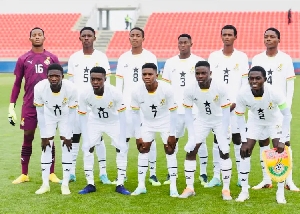- Home - News
- TWI News | TV
- Polls
- Year In Review
- News Archive
- Crime & Punishment
- Politics
- Regional
- Editorial
- Health
- Ghanaians Abroad
- Tabloid
- Africa
- Religion
- Election 2020
- Coronavirus
- News Videos | TV
- Photo Archives
- News Headlines
- Press Release
Opinions of Wednesday, 6 February 2008
Columnist: Tawiah, Benjamin
At Last a Good Reason to Stay in Ghana
The discovery was almost serendipitous, or so it seemed. Yet we welcomed the prospect with measured anticipation, as if we had always known it was coming. We entirely forgot that we had toyed with a similar idea years ago, and we had watched it spirit away before there was ever a drop of that commodity. This time, however, it appears we have reason to believe that an oil boom in Ghana would change our fortunes and make our worth count more than ever before. The President of the republic has only recently admonished Ghanaians, who have always longed to travel abroad, to stay home because the economy of Ghana would be much better when the oil starts pouring in. And there are indications that as early as 2009, 60,000 barrels of oil will be produced everyday in Ghana. The major players in the deal, Tullow Oil and Kosmos, are under some pressure to produce results from their preliminary work on the two deepwater blocks of Tano and West Cape, which are estimated to hold some 1.3 billion barrels of oil. Experts from Norway have been called in to show us how they managed to enrich Norwegians with 92% of their oil revenue.
These are good signs that an economy that is presently experiencing a 5% growth rate would be prosperous when the oil revenue starts showing up. But, they only remain indications, because we would not reap on that huge investment until 2012 or much later. In the meantime, gold deposits have been discovered in some parts of the country, and cocoa production is estimated to hit 700,000 tones soon. Of course, the Bui Dam is another thing to cheer about. The economy appears stable and the re-denomination of the Cedi has been successful. The Governor of the Central Bank of Ghana has been adjudged the best Governor in Africa this year for pursuing good reforms to achieve set targets. To cap it, the Millennium Challenge Corporation has rated Ghana first among 77 countries for effective governance. Our control of corruption is the second best on the scorecard of the US based corporation.
All these have happened in the last seven years under President Kufour. So, perhaps, the President was only being charitable when he declared at a function in Techiman in the Brong Ahafo region that “God has blessed Ghana” during his tenure in office. These blessings notwithstanding, the life of the average Ghanaian has not changed much in the last decade. The official website of the Ghana Statistical Service, www.statsghana.gov.gh, states in the opening paragraph of a major section on key social and economic indicators that: “The social, economic and demographic structure of the country has not changed much since independence.” This information has been repeated in the second paragraph, in the same wording. The mistake or oversight instantly vindicates the information contained therein that things have not changed much for a long time. Somewhere on the site, there is information on incidence of poverty, which has reduced from 52% in 1991/92 to 28% in 2005/6. If we have maintained the same economic structure since independence, then the changes that may have informed the 5% economic growth rate may have occurred somewhere else, other than in Ghana. This is the language of economics, and I don’t pretend to know what any morpheme stands for; what I prefer to ask is whether the revenue from oil would change the economy in a way that would benefit the poorest people in Ghana.
Most African countries whose economies subsist on oil revenues have been bad examples for so long. Nigeria, Gabon and Angola are just as poor as other economies in Africa that are essentially agrarian. Oil for Development, a policy that oil-rich nations, such as Norway, pursue to help developing countries with oil deposits, has failed to change the fate of those countries, and more than half of their population live in deplorable conditions. Instead of oil revenue, remittances from abroad have become the lifeblood of many average families surviving on less than a dollar a day. Incidence of migration to rich countries has therefore become very high, as people dread surviving in the ever-worsening living conditions. As we join the privileged club of oil rich countries, it is important to ask if Ghanaians would have reason to leave behind their families, to pursue prospects in the rich economies of the West. Presently, it seems to be the dream of most young people to flee the hard economic conditions in Ghana. Only last week, some members of the ruling NPP government in the central region urged the government to do more to better the worsening living conditions in the country. These party officials may have done the unusual thing by criticising their own government, but their concerns are shared by majority of Ghanaians, as the ‘Yewuo’ demonstration gathers momentum. Our concern now should not be whether the demonstration is necessary or not; our main worry should be how we can confront the problems that lie ahead. It is not the time for spin or bluster; it is the moment for some deep introspection. Have policies worked?
The Guardian newspaper in the UK recently published the chilling story of Kingsley Fosu, the Ghanaian stowaway miracle survivor, whose ordeal years ago made news around the world. He was the inspiration behind Deadly Voyage, the Hollywood blockbuster that broke box office records. Deadly voyage was Fosu’s story. He was catapulted onto the realms of comfort when Union Pictures, a film production company in the USA, paid him a huge sum to film his story. When the Guardian’s Nick Davies traced Fosu to his small flat in Accra fourteen years after the Hollywood breakthrough, he had been reduced to the poor life he had escaped as young boy. Listening to his interview on BBC Radio 4 here in London this week, I gathered that it is not only Fosu who had made a deadly voyage as a stowaway; all of us will be making such voyages in the future if globalisation does not succeed in making the world a better place for all. Fosu had questioned the imperatives of our times in the interview he granted the Guardian writer: “I can’t think of any good reason why some people are suffering and other people are enjoying, even though we are in the same world.” These were the very sentiments he had expressed as a 23 year old, when he embarked on the voyage. Fourteen years later, the same thoughts are with him. He had cried during the preview of the film in London, and he is still crying today, as the investment on the $65,000 lump sum that was paid him has produced nothing. He is now in huge debt and facing the prospect of a poorer life in Ghana.
If conditions remain as they are in poor countries, the world would soon embark on a voyage deadlier than Fosu’s. Stowaways to the unknown seashores of advanced countries are perhaps on the increase today. They are now better organised than before, and the methods they employ are very sophisticated. On my holiday to Amsterdam only recently, I chanced on a group of Ghanaian young men, including a middle-aged woman, who had transported themselves like cargo in lorries from other countries. The desperation on their faces was almost palpable. They had fled conditions in Ghana for a better life abroad. As they watched that life slip by, with no lodgings and no food in a strange part of the world, the question on their faces was whether it was worthwhile to have taken the risk. Yet, they still harbour the feeling that their desperate conditions hold more promise than life in Ghana. Even as that promise eludes them daily, they remain an inspiration for folks back in Ghana.
Perhaps, the reason why a lot more Ghanaians would flee Ghana when the oil starts pouring in is not that conditions would not change; it is that these days, people prefer to live like the traditional Fulani, constantly moving in search of fresher settlements. And in our case, the need for fresher life elsewhere sometimes becomes irresistible. Development policies of government tend to prevent people from leaving their countries to face uncertain future elsewhere, but they do not deter those who are bent on a voyage. Where policies fail to improve lives, people only pay a punitive price for mere existence. How long can any right thinking man pay such a price?
Carla Ann Vanbestein, an American lady of German descent, wrote to ask for my “honest opinion” on why so many Ghanaians travel abroad and refuse to go back. She finds it very unusual that somebody would decide to leave where they were born and bred to settle in a foreign country forever. She is 58 and has never left America. She has refused to apply for a passport, because she cherishes the life she has so much that she does not dream of living somewhere else for another day. More importantly, she wanted to know whether I wouldn’t be making a valuable contribution to the development of my country by returning to teach there, instead of practising my trade in London. “Is it because of the money,” she quizzed. Need I dignify such a question with an answer? The answer, I thought, was decipherable from the question.
For so long, the world has bore with the ever-increasing disparity between the rich and the poor. The pejorative designation of some countries as ‘Third world’ has almost become accepted. The old arguments on imbalances in international trade, insufficient aid, terrible conditions on loans and poor grants, need revising, because the world keeps changing. If I could pop into a departmental store and buy a well-tailored suit with less than half of a week’s income, why would I retire to live in another part on the globe, where it would take a year’s savings to get a less quality variant of the same item? If I could afford relative luxury while living an average life in a welfare economy in the richest parts of the world, what obligation do I have to contain the stress that extreme poverty puts on the soul? These thoughts provide escape routes for the poor in the developing world, who flip-flops between despair and desperation. And they do find ways to escape most of the time.
Now, we can escape to comfort zones because the exigencies of the times have so far made it possible. Poor countries have more than a responsibility to act swiftly to better their living conditions, as the escape routes to the West continue to get tighter. We in Ghana can look forward to having a good economy if we are able to effectively manage the revenue from the newfound oil. Doubts have been expressed about what changes the oil revenue will bring to the poor rural dweller in Ghana. In Nigeria, those who live in the oil rich States of River, Delta, Imo and Ogun, have been mere spectators to the vast oil revenue that is looted by the privileged few. Nigerians continue to seek good life abroad, as living conditions in that country fail to improve.
While it is too early to say what would change in Ghana when China and America scramble for our oil, it is important to ask whether those changes would be palpable enough to guarantee a comfortable life in Ghana. Now, the spring is wound up tight, it will uncoil of itself with the least trigger. Let’s see the direction it goes this time.










